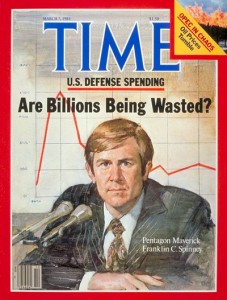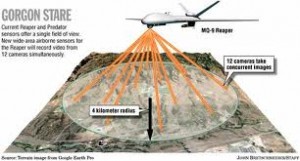
BELOW REFERS TO PREVIOUS POST:
Reference: Gorgon Stare–USAF Goes Nuts (Again)
Another Technical Showboat
Chuck Spinney and Robert Steele have pretty well identified the new U.S. Air Force (USAF) drone program for what it is, but here are some ancillary remarks on the subject.
The Gorgon Stare, a new UAV built presumably to USAF specifications is a technological marvel and does indeed multiply not only surveillance capabilities, but store and forwarding capabilities as well. In the excitement over this new collection platform several essential questions are being ignored.
The most important is how much help is this device going to be in actually fighting enemy forces in Afghanistan. Is it going to help the U.S. or Coalition High Commands understand that what they call the “Taliban” is not a monolithic force with an elaborate hierarchy using a Soviet era command and control systems? But is actually a rubric for disparate tribes, groups, and gangs that engage the foreigners when they fell like it or to protect their opium trade or home village or to up grade their armament. I don’t think so.
Perhaps it will help the actual U.S. and Coalition fighters (boots on the ground) by providing heads up warnings of impending attacks or dangerous stretches of road. Perhaps but this will depend not simply on enhanced surveillance, but as Robert Steele has observed enhanced processing as well.
Thus the second important question is how will all the extra data being down linked from the Gorgon be processed, analyzed, and disseminated in a timely manner? It may not be, but it can be certain with all the extra data coming in the USAF will argue for greatly increased processing staffing along with new information handling systems with impressive, if expensive, bells and whistles. This of course will be a hidden, but real addition to the cost of the Gorgon. So will enhanced processing and analytic capabilities mean that Gorgon data may actually get to the war fighters in time to save lives and materially aid in defeating enemy forces? My guess is it won’t make a bit difference.
Unfortunately the whole Gorgon Stare Program is one more example the increasing tendency to use technology as a substitute for target knowledge and analysis (what Chuck Spinney calls synthetic as opposed to analytic thinking). As one who designed my share of ‘Gold Plated Shovels with Rope Handles’, I suspect the Gorgon falls into that category.
Phi Beta Iota: See the three graphics below. Historically the excess profit is in collection with few humans, and both government managers and contractor carpet-baggers shy away from the processing challenge–the contractors don't do processing well (a major problem with single-point of sale snake oil salesmen) and humans are “messy” and there are not enough of them to go around if you insist they have clearances. The future is HUMAN, Multinational, Ezight-Tribe Sharing, and THINKING. Gorgon Stare has no brain and neither does the US Air Force. This web site contains all of the information the US Government refuses to take seriously. Until at least one element of the US Government gets serious about creating intelligence for every level of command across all mission areas, Gorgon Stare will continue to be the norm: expensive, useless, and harmful to the infantry that take 80% of the casualties because 96% of the Pentagon's budget continues to be spent irresponsibly (and without being accounted for in a responsible manner either).
Graphic: OSINT and Lack of Processing






